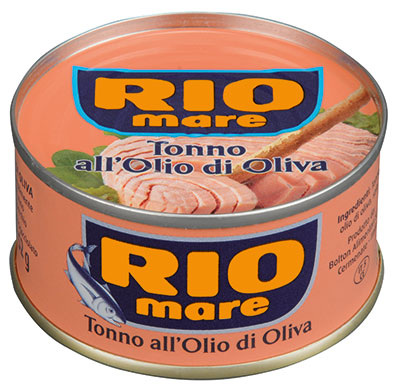Metal packaging: guaranteeing safety and sustainability
Steel and aluminium packaging is ideal for food products, offering the longest shelf life, guaranteeing room temperature storage and protection against contaminants. And they can be recycled ad infinitum. Rio Mare is a case in point (www.riomare.it, Bolton Alimentari).
 Bolton Alimentari, a canned tunafish market leader with the historic brand Rio Mare, has always been on the front lines of environmental responsibility and sustainable growth. Starting in 2011, Bolton Alimentari decided to make public its Corporate Social Responsibility program, “Responsible Quality”, which calls for all around quality along the entire supply chain, from the moment the fish is caught until the product arrives on the consumer’s table.
Bolton Alimentari, a canned tunafish market leader with the historic brand Rio Mare, has always been on the front lines of environmental responsibility and sustainable growth. Starting in 2011, Bolton Alimentari decided to make public its Corporate Social Responsibility program, “Responsible Quality”, which calls for all around quality along the entire supply chain, from the moment the fish is caught until the product arrives on the consumer’s table.
Bolton Alimentari’s Corporate Social Responsibility Director, Luciano Pirovano, responds to questions by ANFIMA*.
In this virtuous journey Bolton Alimentari has undertaken, how important is the choice of packaging?
The choice of aluminium or tin plate packaging is one of the cornerstones of our commitment to protecting the environment and constitutes part of a broader commitment that ranges from fishing (with our membership in the International Seafood Sustainability Foundation - ISSF, as well as our decision to adopt the pole & line fishing technique) to social issues (Bolton actively collaborates with the food bank organization Banco Alimentare, Editor’s note), from nutrition, with our initiatives with Expo 2015 and the Nutrition Foundation of Italy, to the environment, with consumption reductions and 95% recovery of waste materials, the use of 100% renewable energy and the choice of packaging, naturally.
Is metal still the best choice in terms of safety and reliability in preserving foods?
A metal container enables subjecting the product to heat processes that enable guaranteeing safety without the use of preservatives. Thanks to aluminium and tin plate packaging, for example, it’s possible to keep intact the nutritional properties of fresh fish.
Metal is an extremelly resistant material that enables protecting the organoleptic properties of the product, because it guarantees 100% protection against oxygen, gases, light, humidity and contaminants, thus virtually eliminating perishability.
What are the advantages of using steel and aluminium packaging for the producer, the distributor and the retailer?
First and foremost, shelf life. With an expiry date of five years, canned tuna “virtually never expires”, neither on retailer shelves, nor in consumers’ pantries. Furthermore, it’s important to keep in mind that products preserved in steel and aluminium containers can be stored at room temperature and therefore do not require any freezing or refrigeration. This carries energy savings to the entire supply chain, from the producer to the shippers, retailers and consumers. It also fosters transportability and product storage even in problematic regions or countries. Finally, in addition to these advantages, the can is well-adapted to acts of charity, such as in the case of initiatives that we organize in collaboration with Banco Alimentare.
In the case of food products, what are the values of metal containers that consumers most appreciate?
The advantages are numerous, first of all, as mentioned above, long shelf life: consumers are happy to stock canned tuna in the pantry, because it never gets thrown out before it can be eaten.
Moreover, the can is a sustainable form of packaging, easy to dispose of for separate collection, and with a a high rate of recyclability.
Indeed, from every discarded Rio Mare can it is possible to produce a new can without in any way compromising the raw material, as happens in the case of other packaging materials.
*ANFIMA (www.anfima.it) is the Confindustria association that brings together Italian metal packaging manufacturers.
|
Metal, permanent material Steel and aluminium are resources that are permanently available: easy to separate, they can be recycled ad infinitum without losing their intrinsic properties. Thanks to metal recycling, it is possible to save up to 75%, in the case of steel, and 95% in the case of aluminium, on energy used to produce raw materials. Furthermore, technological advancements and improved recycling rates have enabled reducing the environmental impact of steel food containers by an average of 30% during the last ten years (study by EMPAC - European Metal Packaging on the environmental performance of the three-piece tin plate can for food products). During the period under analysis, the average weight of the metal container decreased by 6%, while the average recycling rate in Europe increased by 44%. For more information: www.empac.eu/it |

















